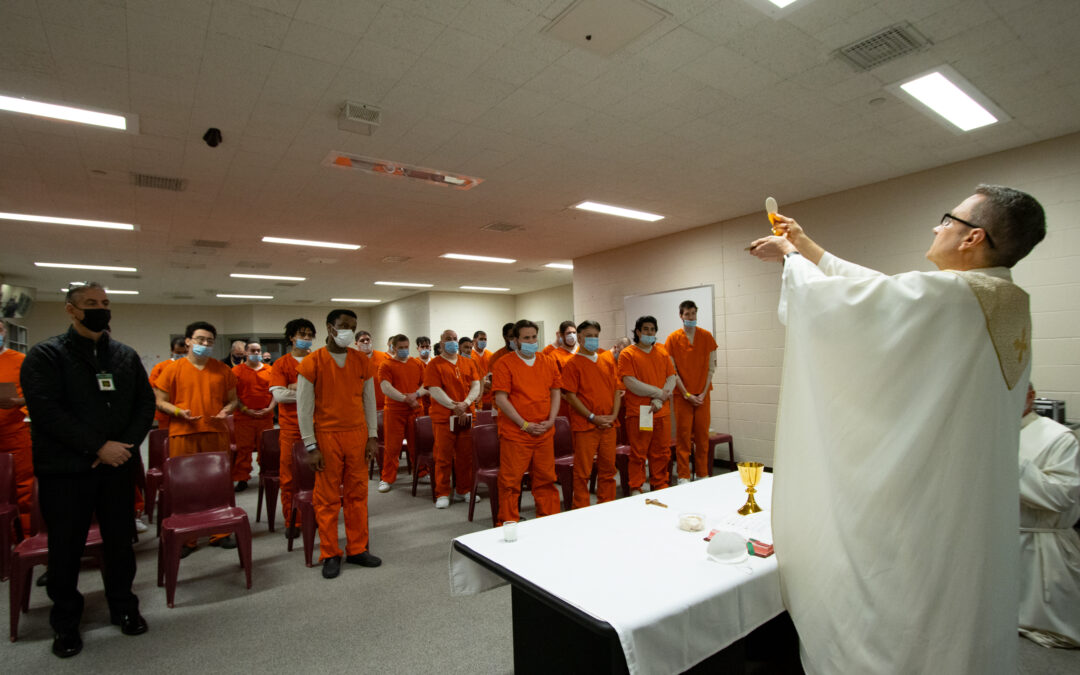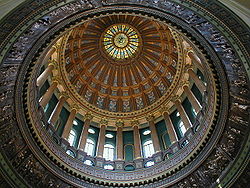
Scholarship Recipients Face Uncertain Future After Legislature Failed to Act
The Catholic Conference of Illinois has issued the following statement on the Illinois General Assembly’s failure to act in order to continue the Invest in Kids scholarship program. A PDF of the statement can also be found HERE.
Scholarship Recipients Face Uncertain Future After Legislature Failed to Act
It is difficult to put into words the level of disappointment so many are experiencing today after learning the Illinois General Assembly failed to renew the Invest in Kids Act.
This year alone, Invest in Kids is providing more than 9,500 scholarships to qualifying low-income families who want their child to attend a non-public school. Due to the cruelty of the Illinois General Assembly, those 9,500 scholarships will not be available next school year. In addition, the hopes of more than 26,000 students on a waitlist who so desperately want a scholarship have been dashed as has using Invest in Kids scholarships at high school-level trade schools.
Sadly, we expected more from our elected state senators, representatives and Governor. At the very least, we expected them to represent the opinions of their constituents. An Impact Research poll conducted in August 2023 found that a majority of Illinois voters supports the program in all regions of the State; most notably it is supported by parents, voters of color and voters with incomes below $40,000 per year. Support remains high even after voters hear arguments about the program from critics and proponents alike. Who, then, are the members of the Illinois General Assembly who did not support renewal representing?
Six years ago, supporters of Invest in Kids were told that this was a pilot program. We were asked to see how it goes. Here is how it has gone:
- Of the 40,000 families who have received a scholarship, more than 97 percent are satisfied with the program. Children report they feel safe in school, and they are learning.
- The demand for the program is staggering – for every child in the program, three are on a waiting list due to funding constraints.
- The number of Black and Latino children in the program has grown steadily, and Black and Latino students participate in the program at higher rates than in public schools.
Where do we go from here? Despite this setback, we will build on the incredible efforts of the thousands of people who went to Springfield, wrote letters, called their legislators, put up yard signs and attended the many Town Hall meetings. Those efforts resulted in a lot of support to continue the program, and one could argue a majority does support it. We are grateful to those lawmakers who came out publicly to renew the program so more scholarships could be awarded.
The General Assembly reconvenes in January. We must continue our efforts to find a way that allows for more educational opportunities such as Invest in Kids for low-income students and parents who need this program.
This work is not over. The kids are worth the fight.

Illinois Catholic Bishops Share “A Catholic Vision for Restorative Justice in Illinois”
Illinois Catholic Bishops Share “A Catholic Vision for Restorative Justice in Illinois”
Download the .pdf document HERE.
The approaching season of Lent is an opportunity for us to reflect on how our sins have broken our relationship with God and with others and yet also gives us a chance to be accountable for our actions, to both give and receive mercy and forgiveness, to restore those relationships, and to experience our own spiritual renewal. Restorative justice similarly offers this opportunity within our criminal justice system by bringing together those who have harmed and those who have been harmed, including families and communities, to participate in the healing processes of accountability and forgiveness so relationships broken by wrongdoing can be restored.
Therefore, as we prepare for the Lenten season, the Illinois Catholic bishops are pleased to share the document “A Catholic Vision for Restorative Justice in Illinois,” which is inspired by the experiences of our Illinois Catholic Prison and Jail Ministry Network – a statewide network of priests, deacons, religious, and lay people among all six of our dioceses who minister to those incarcerated as well as victims of crime, families, and communities. In this document, we explore how we can renew our criminal justice system, so it is focused not only on punishment but truly recognizes and respects the human dignity of all by being more rehabilitative, restorative, and healing and providing more opportunities for reentry. Transforming our criminal justice system to be more restorative advances the common good by helping to create safer communities and to heal all those affected by wrongdoing so they may have more hopeful futures.
We encourage all to read and reflect on “A Catholic Vision for Restorative Justice in Illinois.” Alongside all people of good faith in our state, the Catholic Church in Illinois is committed to work with the state to bring this vision to fruition.
We offer special thanks to Emily Cortina of Kolbe House of the Archdiocese of Chicago and Brian Hickey (formerly of the Office for Human Dignity of the Diocese of Joliet), and all the members of the Catholic Conference of Illinois’ Prison and Jail Ministry Committee, for their assistance in developing this document.

Statement on Passing of Assault Weapons Bill
The Catholic Conference of Illinois would like to commend the Illinois General Assembly and Governor J.B. Pritzker on banning assault weapons and high-capacity magazines with the passage of House Bill 5471.
Too many times our state has witnessed the horror of mass shootings, and we hope this legislation will help to provide some peace in our communities going forward. We are grateful for the ban of these deadly weapons in our state. We also recognize that, as was stated in the debate over the legislation, this will not solve all the challenges associated with mass shootings. There is much more to do. We live in a violent culture, mental health needs are many, and too many families are in crisis. We stand ready to work with the General Assembly to help address these challenges.

Catholic Conference of Illinois Statement on Assault Weapon Ban Legislation
Illinois is no stranger to the growing national crisis of mass shootings. Just in the past few years, mass shootings in Highland Park, Aurora, Chicago, and Northern Illinois University inflicted death, terrible pain and a significant deterioration of our citizens’ sense of safety. On behalf of the Catholic Church in Illinois, and all people of goodwill, we, the Catholic Bishops of Illinois, do not believe we can afford to sit back, waiting in dread for the next tragedy.
There are many factors that lead to mass shootings. Mental illness, familial breakdown, physical and emotional abuse, a culture celebrating violence and devaluating life, feelings of hopelessness and easy access to firearms all play contributing roles, and all of these issues must be considered and addressed. We urge all members of the General Assembly to consider carefully the myriad causes of these horrific events and the policy prescriptions that might be enacted to reduce or prevent their occurrences. We pledge our support in this difficult work.
The longstanding position of the United States Conference of Catholic Bishops (USCCB), which was recently restated on July 3, 2022, has been to support “a total ban on assault weapons and limitations on civilian access to high-capacity weapons and ammunition magazines.” We now call on the members of the Illinois General Assembly to ban these deadly weapons in our state, as a means of protecting the common good and preserving life and peace in our communities.
This effort is a bi-partisan responsibility. All parties are morally obligated to work together on these issues, and we stand ready to help as needed.

2022 Spring Legislative Summary
STATE BUDGET
Flush with federal assistance and higher than expected tax collections (fueled by high inflation), the state budget for fiscal year 2023 will come in around $47 billion, featuring an 8% increase for state operations, temporary tax cuts and debt payments.
$1.8 billion in tax cuts
– The state will send individual-filing taxpayers a check for $50 and joint filers $100. Each dependent child will generate another $100 check;
– $300 property tax rebates for homeowners;
– Suspends the grocery tax for one year;
– Back-to-School sales tax holiday;
– 6-month freeze on the inflation-adjusted increase in the Motor Fuel Tax paid (2.2 cents per gallon) paid for with a 12-month diversion from the Leaking Underground Storage Tank Fund; and
– Expands the state’s Earned Income Tax Credit (EITC) from 18 to 20 percent. Also, young adults (ages 18-24), seniors (65 years old or older), and persons who have Individual Taxpayer Identification Numbers (ITINs) instead of Social Security numbers will be eligible for the state EITC.
$1.5 billion for savings and debt payment
– $1 billion to the Rainy Day Fund; and
– $500 million into pension fund debt.
$ 200 million for “public safety initiatives”
$20 million for the Illinois Nonprofit Security Grant Program
– Under this program, nonprofits, including churches, can apply for state grants for needed security measures.
CCI ISSUES
Invest in Kids Act
House Bill 4126 (Tarver (D) – Chicago and Cunningham (D) – Chicago) – This legislation creates a “super-priority” status for current scholarship recipients and allows for awarding partial scholarships for qualifying families whose income exceeds 185% of federal poverty level. The provisions of the bill are relatively minor improvements to the program, but this work is accomplishing the additional goal of engaging our grassroots and building more support in the General Assembly. As evidence of the successful strategy, the bill passed the House and Senate on unanimous roll calls. The bill will soon be sent to the Governor.
We were also able to make some technical corrections, ensuring all areas of statute agree on the program’s current January 1, 2025 sunset date, in the Budget Implementation Bill.
Catholics for Life
House Bill 4221 (Cassidy (D) – Chicago) – This legislation seeks to target Crisis Pregnancy Centers with burdensome promotional mandates that would infringe on their operations and free speech rights. It also seeks to impose an individual right to civil action that would threaten the Centers viability. CCI opposed this legislation, and it did not move forward.
House Bill 4247 (Hernandez (D) – Chicago) – This legislation requires public universities to make emergency contraception available through on-campus vending machines. These drugs are already available over-the-counter and in university health centers. CCI opposed this legislation. The bill passed the House on March 3, 2022 by a vote of 62-38-2, but was not taken up by the Senate.
Conversion Therapy
House Bill 5162 (Yingling (D) – Round Lake Beach) – This bill would have prohibited organizations, including religious organizations, from receiving any state funding if they are practicing “conversion therapy.” CCI opposed this legislation because “conversion therapy” is not defined in the legislation. The bill passed the House but did not move in the Senate as of the end of this session.
Immigration
Senate Bill 3144 (Villanueva (D) – Chicago) – This bill will create a state task force to explore how to provide universal legal representation to immigrants facing deportation. CCI supported this bill, which passed both chambers and will be sent to the Governor.
House Bill 4343 (Gillespie (D) – Arlington Heights) – Among the provisions in this bill is the expansion of state medical coverage to low-income noncitizens ages 42 to 54. Under past legislative efforts, low-income noncitizens 55 years old or older are already eligible for state medical coverage. This bill passed both chambers and will be sent to the Governor.
Prison & Jail Ministry
House Bill 3465 (Lilly (D) – Oak Park) – This legislation calls on each institution or facility of the Illinois Department of Corrections to hire a reentry specialist to assist persons with reentry back to their communities. CCI supported this bill, which passed both chambers and will be sent to the Governor.
Cemeteries
House Bill 4552 (Cassidy (D) – Chicago) – This bill would allow for natural organic reduction of human remains (“human composting”) in Illinois. CCI opposed this bill, which passed a House committee but did not move forward as of the end of this session.
